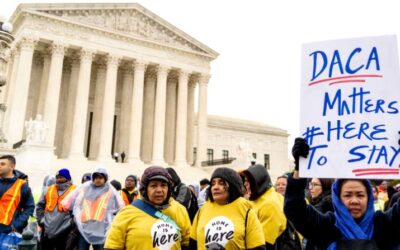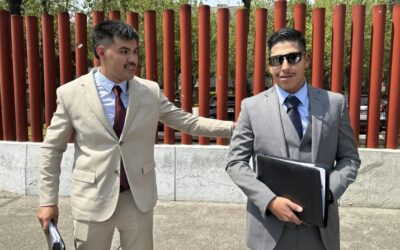Pueden encontrar la versión en español aquí.
Deferred Action for Childhood Arrivals, or DACA, grants undocumented immigrants who were brought to the U.S. as children temporary protection from deportation and allows them to work legally. This is the first story in a three-part series documenting the journeys of DACA recipients in Mexico and how the trips could change their lives in the Colorado River Valley.
DACA recipients can’t normally travel abroad, or else they’d risk those protections. However, some DACA holders in the Colorado River Valley are taking advantage of a federal permit that allows them to travel internationally for employment, education, or humanitarian purposes.
Luz Galaviz is a 3rd grade teacher in Rifle who was born in Mexico. She acquired advance parole to travel to Mexico City in May with Latino advocacy nonprofit Voces Unidas as part of its Civic Leader Education and Advocacy Program (CLEAP).
Returning to Mexico was both emotional and risky. U.S. Customs and Border Protection, which inspects international travelers at airports, can deny DACA recipients entry, even with the appropriate documentation.
Halle Zander produced the following story on Galaviz’s experiences as a child first arriving in the Colorado River Valley, and why, years later, she embarked on a trip to Mexico that could risk her deportation protections.
You can listen to the story or read the following transcript.
Halle Zander: Luz Galaviz was 5 years old when she first stepped foot in the United States. She’s spent most of her life in the Colorado River Valley, going to school between Glenwood Springs and Parachute.
Luz Galaviz: It was really hard for me in school, learning a whole new language — a new culture I think was the biggest thing, how the schools are run, asking to go to the restroom, just simple things that to us don’t seem like a big deal.
Zander: Despite the challenges, she wanted to return to those schools and become a teacher.
Galaviz: I loved working with kids, and I loved watching them learn something new was always exciting for me, like that light bulb. Just watching my students, who are Mexican or Latino, really just relate to my life and me relate to their lives.
Zander: Deferred Action for Childhood Arrivals, or DACA, can protect undocumented teachers, like Galaviz, from deportation and give them a work permit. She applied in 2012 when it first came out, just as she was graduating high school. It doesn’t provide a path to citizenship and only lasts two years at a time, but she felt privileged, in a way.
Galaviz: I really just felt blessed to have DACA, because I know that it’s more than a lot of people have.
Zander: DACA recipients typically can’t travel abroad. But earlier this year, Galaviz heard that Latino advocacy nonprofit Voces Unidas was hosting a trip to Mexico City, and it was open to DACA recipients. It would be her first opportunity to return to Mexico since she first arrived in the U.S. She was accepted into the weeklong program.
Galaviz: I’m still kind of catching up with my feelings. I don’t really know Mexico. I’m also Mexican, but living in the United States for so long, there’s something different. When they find out like, ‘oh, you’re from Mexico’ … And they ask you like, ‘oh, do you go there often?’ And you would just lie, ‘Yeah, I go there all the time,’ because you’re just ashamed of not having a status and being able to go back and forth.
Zander: To travel internationally under DACA — and return — you have to be granted advance parole, which comes with risks. Customs could still keep you from reentering the country, but for Galaviz, it was worth it. And on May 28, it was time to fly out.
Galaviz: I woke up around 1:30 and my parents dropped me off. They wanted to bring me to the airport. We went through TSA, which was really long. It looped all around. I don’t know how many terminals.
Zander: Galaviz almost missed her flight from Denver to Salt Lake City, even though she was three hours early. Rushing to the gate, breathing heavily, bag falling off her shoulder, she’s smiling as she’s running. During her layover, Galaviz sits at the gate, and closes her eyes to imagine what Mexico might look like — what it’ll feel like.
Galaviz: I visualize a feeling of home. It is your home, but at the same time, it’s a foreign country to you.
Flight Attendant: We’d like to welcome you to Mexico City, where the approximate time is about 1:30 p.m.
Galaviz: I just kept repeating, “I’m in Mexico. I’m in Mexico. I’m in Mexico. This is Mexico.”
Zander: Walking around downtown Mexico City each evening, she’s scanning the streets, absorbing everything she sees, and everything she missed from when she was a kid.
Galaviz: I want to know what that bike right there looks like. I want to remember. And that pole right there, too. And just like seeing the people walking and the cars driving and the buildings, it made me think about all the other reasons why people leave and why my parents left.
Zander: In the first few days, Galaviz learns about advocacy work — how to speak to powerful people about policies that impact her directly, including the U.S. ambassador to Mexico, Ken Salazaar, at the embassy.
Galaviz: We’re just going to be asking, “What’s impeding us from finding a permanent solution for childhood arrivals whose home is the United States?”
Zander: She spoke to Ambassador Salazaar in his offices. He nodded as she spoke, took diligent notes, and asked her detailed questions about her background. Back at the hotel, she says he was genuine and personable. And yet …
Galaviz: It’s kind of what we’ve seen day in and day out, right? No one has the authority. No one can do much on their end. No one can really give us an immediate answer.
Zander: Over the next few days, Galaviz speaks with other politicians, lawyers, and visits different corners of the city. She’s been beaming the whole trip, glowing under the smoggy skies. But the night before she’s scheduled to return home, the mood shifts. She’s very quiet. For the first time, she takes me by surprise — asks me to stop recording.
Galaviz: Halle, we said no to recording this one.
Zander: She’s been told by lawyers that there’s a chance when she heads home tomorrow, Customs officers might not allow her to reenter the United States. She feels the stress in her shoulders and her chest, bracing for another early morning at the airport filled with uncertainty.
Galaviz: So we woke up pretty early. It was about maybe 4:30 a.m. or something. We drove to the airport. It seemed like the ride there was … it seemed like it was forever. I think we were all thinking about what it was going to be like once we came back. Once we landed, I started to get very warm. We walked through this really long hallway. You walk forever. We sat in a doctor’s office. They didn’t ask any questions at all, and I was expecting to be thoroughly interviewed, I guess. My parents picked me up. They wanted to pick me up, and then we just drove home. It was very, very sweet to come back and be able to see my nephew and my nieces. I think I was most worried about not being able to enter back in and not seeing them again. That would have been the worst fear for me.
Zander: Back in Rifle, Galaviz and I meet up at her classroom. It’s summer, so the hallways are empty except for cleaning crews vacuuming the carpets. We flip over a few chairs as Galaviz considers what’s next for her. With former President Donald Trump possibly returning to the White House next year, and the 5th U.S. Circuit Court of Appeals considering the legality of DACA, it’s uncertain how long her current protections will last.
Galaviz: I’ve seen lawyers in the past just to kind of see where I’m at in the process, and it could be another work visa of another type. I mean, it could take years. Pretty much everyone who is Latino or Mexican, they have people or know people who have mixed-status families. Some of us have citizenship, some of us have DACA. Some of us are undocumented. Every family member has something under that umbrella because it takes forever. It takes forever for anything to go through.
Zander: Reflecting on the trip itself, Galaviz looks relieved.
Galaviz: It was like a very healing journey for me not being able to be back in Mexico for 24 or 25 years. I felt like I missed out a lot as a kid. I felt like I missed out on, like, my culture a lot. I just feel very powerful now, and I feel very proud being able to bring back … share with my students and like, just have that little puzzle piece that I needed, you know?
Editor’s Note: This is the first story in a three-part series documenting the journeys of DACA recipients in Mexico and how the trips could change their lives in the Colorado River Valley.
This story comes to us via a partnership with Rocky Mountain Community Radio and was first aired on Aspen Public Radio.





